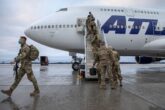November 20, 2019
A fresh approach to peace in Afghanistan
An effective peace process is possible and desirable in Afghanistan. Success, however, will require a careful, step-by-step course to test bona fides, build confidence, reduce violence and encourage the difficult negotiations in which Afghans themselves determine the political future of Afghanistan.
U.S. Special Representative Zalmay Khalilzad has been working to re-engage the peace process in visits to the region, in meetings with international players, and in fostering the just completed detainee swap — two kidnapped professors from American University of Afghanistan in exchange for three Taliban prisoners in Afghan government custody.
The detainee release is a welcome sign that the Afghan government and the Taliban are interested in continuing efforts toward peace, and it signals hope for a fresh approach to confidence-building. However, the complicated process to accomplish the swap and the finger-pointing along the way underscore the serious challenges to seeking an end to the 40-year war in Afghanistan and the 18 years of major U.S. engagement.
Read the full article in The Hill.
More from CNAS
-
Afghanistan: Why Does Trump Want to Retake Bagram Air Base?
Lisa Curtis, senior fellow and program director at the Center for a New American Security joined Deutsche Welle to discuss President Trump's comments on the U.S. regaining con...
By Lisa Curtis
-
A Failure to Plan: Examining the Biden Administration’s Preparation for the Afghanistan Withdrawal
Afghanistan, Iraq, and Vietnam. One failure is a horrible accident; two failures are a tragic coincidence; three failures are a disturbing trend that shows the U.S. government...
By Christopher D. Kolenda
-
Against All Odds
Eighteen months after taking power, the Taliban is intensifying its repression of Afghan civil society and cracking down on the rights and freedoms of all Afghans, especially ...
By Lisa Curtis, Annie Pforzheimer & Jan Mohammad Jahid
-
To Help Afghanistan, Engage Its Political Opposition
The effort to help Afghans shape a better alternative should begin now....
By Richard Fontaine & Lisa Curtis




